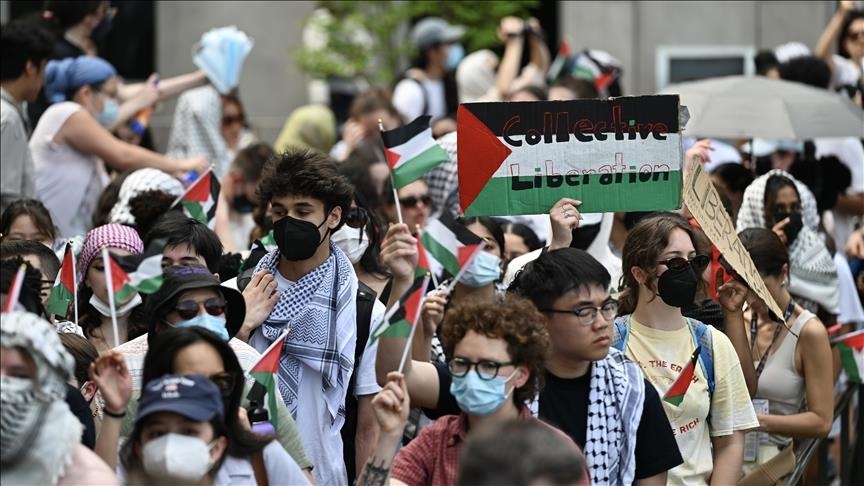News
Columbia University President Quits Months After Gaza Protests On Campus
Minouche Shafik cites ‘period of turmoil where it has been difficult to overcome divergent views across our community’

Columbia University President Minouche Shafik announced her resignation Wednesday after months of criticism over her handling of campus protests against Israel’s war in the Gaza Strip.
“I have had the honor and privilege to lead this incredible institution, and I believe that — working together — we have made progress in a number of important areas,” she said in a letter addressed to the Columbia community.
“However, it has also been a period of turmoil where it has been difficult to overcome divergent views across our community. This period has taken a considerable toll on my family, as it has for others in our community.”
Shafik said she has tried to navigate a path that upholds academic principles and treats everyone with “fairness and compassion.”
“It has been distressing—for the community, for me as president and on a personal level—to find myself, colleagues, and students the subject of threats and abuse,” she added.
The university announced that Katrina Armstrong, CEO of Columbia University Irving Medical Center, will take over as interim president for the upcoming academic year, which begins in less than a month.
Columbia’s protests began in April and have served as a flashpoint for the wider anti-war movement after Shafik asked the New York Police Department (NYPD) to deploy to the school’s campus on April 18, when over 100 people were taken into custody in an attempt to clear an encampment.
Demonstrators quickly adapted, however, and opened a new sit-in on another university lawn.
Shafik again requested the NYPD come to campus on April 30 to break up another protest site and clear students from an administrative building they had been occupying. In all, 112 people were taken into police custody.
This time around, Shafik requested that the NYPD maintain a presence on Columbia’s campus until at least May 17 – the day after the school’s multi-day graduation concluded – “to maintain order and ensure encampments are not reestablished.”
US House speaker welcomes Columbia University president’s resignation
“I stood in President Shafik’s office in April and told her to resign, and while it is long overdue, we welcome today’s news. Jewish students at Columbia beginning this school year should breathe a sigh of relief,” Johnson said in a statement.
His remarks came right after Shafik announced that she was stepping down after months of criticism over her handling of campus protests against Israel’s war in the Gaza Strip.
“As a result of President Shafik’s refusal to protect Jewish students and maintain order on campus, Columbia University became the epicenter for virulent antisemitism that has plagued many American university campuses since Hamas’ barbaric attack on Israel last fall,” Johnson said.
The speaker added that he hopes “Shafik’s resignation serves as an example to university administrators across the country that tolerating or protecting antisemites is unacceptable and will have consequences.”
The university announced that Katrina Armstrong, CEO of Columbia University Irving Medical Center, will take over as the interim president for the upcoming academic year, which begins in less than a month.
Student-led protests demanding universities condemn Israel’s war on Gaza and divest from Israeli firms began in April and have served as a flashpoint for the wider anti-war movement after Shafik asked the New York Police Department (NYPD) to deploy to the school’s campus on April 18, when over 100 people were taken into custody in an attempt to clear an encampment.
Demonstrators quickly adapted, however, and opened a new sit-in on another university lawn.
Shafik again requested the NYPD come to campus on April 30 to break up another protest site and clear students from an administrative building they had been occupying. In all, 112 people were taken into police custody.
This time around, Shafik requested that the NYPD maintain a presence on Columbia’s campus until at least May 17 – the day after the school’s multi-day graduation concluded – “to maintain order and ensure encampments are not reestablished.”
Kenya Insights allows guest blogging, if you want to be published on Kenya’s most authoritative and accurate blog, have an expose, news TIPS, story angles, human interest stories, drop us an email on [email protected] or via Telegram
-

 Grapevine2 weeks ago
Grapevine2 weeks agoRussian Man’s Secret Sex Recordings Ignite Fury as Questions Mount Over Consent and Easy Pick-Ups in Nairobi
-

 News6 days ago
News6 days agoTHE FIRM IN THE DOCK: How Kaplan and Stratton Became the Most Scrutinised Law Firm in Kenya
-

 Investigations1 week ago
Investigations1 week agoMulti-Million Dollar Fraud: Three Kenyans Face US Extradition in Massive Cybercrime Conspiracy
-

 Economy1 week ago
Economy1 week agoIran Demands Arrest, Prosecution Of Kenya’s Cup of Joe Director Director Over Sh2.6 Billion Tea Fraud
-

 Business1 week ago
Business1 week agoA Farm in Kenya’s Rift Valley Ignites a National Reckoning With Israeli Investment
-

 Africa1 week ago
Africa1 week agoFBI Investigates Congresswoman Ilhan Omar’s Husband’s Sh3.8 Billion Businesses in Kenya, Somalia and Dubai
-

 Grapevine3 days ago
Grapevine3 days agoA UN Director Based in Nairobi Was Deep in an Intimate Friendship With Epstein — He Even Sent Her a Sex Toy
-

 Politics2 weeks ago
Politics2 weeks agoSifuna, Babu Owino Are Uhuru’s Project, Orengo Is Opportunist, Inconsequential in Kenyan Politics, Miguna Says
















